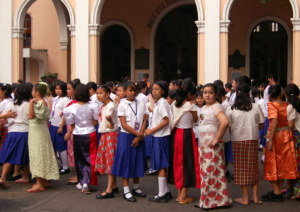Sex Education in the Philippines
 The general purpose of sex education is to inform youth on topics including sex, sexuality and bodily development. Quality sex education can lead to better prevention in STDs and unwanted pregnancy. Furthermore, it decreases the risks of having unsafe sex and increases responsible family planning. To help address issues, like overpopulation, high rates of teen pregnancy and the rise of HIV, the Philippines is gradually implementing sex education and accessibility to contraceptives.
The general purpose of sex education is to inform youth on topics including sex, sexuality and bodily development. Quality sex education can lead to better prevention in STDs and unwanted pregnancy. Furthermore, it decreases the risks of having unsafe sex and increases responsible family planning. To help address issues, like overpopulation, high rates of teen pregnancy and the rise of HIV, the Philippines is gradually implementing sex education and accessibility to contraceptives.
Reproductive Health Act
The Philippines passed the Responsible Parenthood and Reproductive Health Act of 2012 (RH Act) after a 14-year wait. Through the act, the government integrated sex education into the public school curriculum for students ages 10 to 19. The Philippines also gave funding for free or subsidized contraceptives at health centers and public schools.
The government passed the RH Act in response to the many health issues impacting the country, such as infant mortality, pregnancy-related deaths and a rise in HIV/AIDS cases. Moreover, teen pregnancies in the Philippines are common, where 9% of women between the ages of 15 and 19 start child bearing.
Lack of knowledge about reproductive health is significantly associated with poverty, especially in regard to overpopulation. Therefore, the RH Act aims to help the population make informed decisions about their reproductive health. It provides more equal access to sex education, while also ensuring that the government reaffirms its commitment to protecting women’s reproductive rights, providing accessible family planning information, and hiring skilled maternal health professionals to work in both urban and rural areas of the Philippines.
Opposition from the Catholic Church
Around 80% of the Philippine population identifies as Roman Catholic. Accordingly, the Catholic Church largely influences the state of sex education in the country. The Catholic Church opposes sex outside of marriage and fears sex education will increase sexual relations. The Catholic Church consequently remains critical of the RH Act, increasing difficulties in putting the RH Act into concrete action.
Additionally, the Catholic Church opposes implementing sex education in schools as well as the distribution of contraceptives. The Church prefers to rely on parents to teach their kids about reproductive health. However, many families are either unequipped to do so or will not address the subject directly with their children.
The Implementation of the RH Act
In an effort to reduce the country’s rate of poverty, Philippine President, Rodrigo Duerte, ordered the government to provide access to free contraceptives for six million women in 2017. Duerte aimed to fulfill unmet family planning needs. This came after a restraining order was placed on the RH Act in 2015. However, the government appealed to lift the restraining order to continue applying the RH Act and addressing issues due to overpopulation.
In 2019, Save the Children Philippines — an organization with the purpose of supporting Filipino children — advocated for the Teenage Pregnancy Prevention bill. The organization also fought for requiring schools to fully integrate Comprehensive Sexuality Education (CSE) into their curriculum. Save the Children Philippines hopes to combat the country’s high rate of teen pregnancy. CSE in the Philippines includes topics such as consent, sexual violence, contraceptives and others. The bill would also advance access to reproductive health services, further supplementing the goals of the RH Act.
Increased Conversation Surrounding Sex Education
In addition to greater governmental action, there are various organizations that are working to increase access to sex education and services in the Philippines. The Roots of Health is a nongovernmental organization that provides sex education to women in Palawan and Puerto Princesa. Started in 2009, the founders, Dr. Susan Evangelista and Amina Evangelista Swanepoel, initially provided reproductive health classes at Palawan State University in Puerto Princesa and have since expanded into free clinical services for young women. The Roots of Health provides services that assist with birth, reproductive healthcare, contraceptives, prenatal and postpartum check-ups, and ultrasounds. By 2018, they served 20,000 women and adolescents in the Palawan and Puerto Princesa communities, demonstrating that there is a growing grassroots movement towards reframing reproductive health in the Philippines.
Sex education will remain a controversial subject in the Philippines. Nonetheless, it is a developing matter that is expected to evolve with continued conversations between governmental, faith and nongovernmental actors.
– Zoë Nichols
Photo: Flickr
